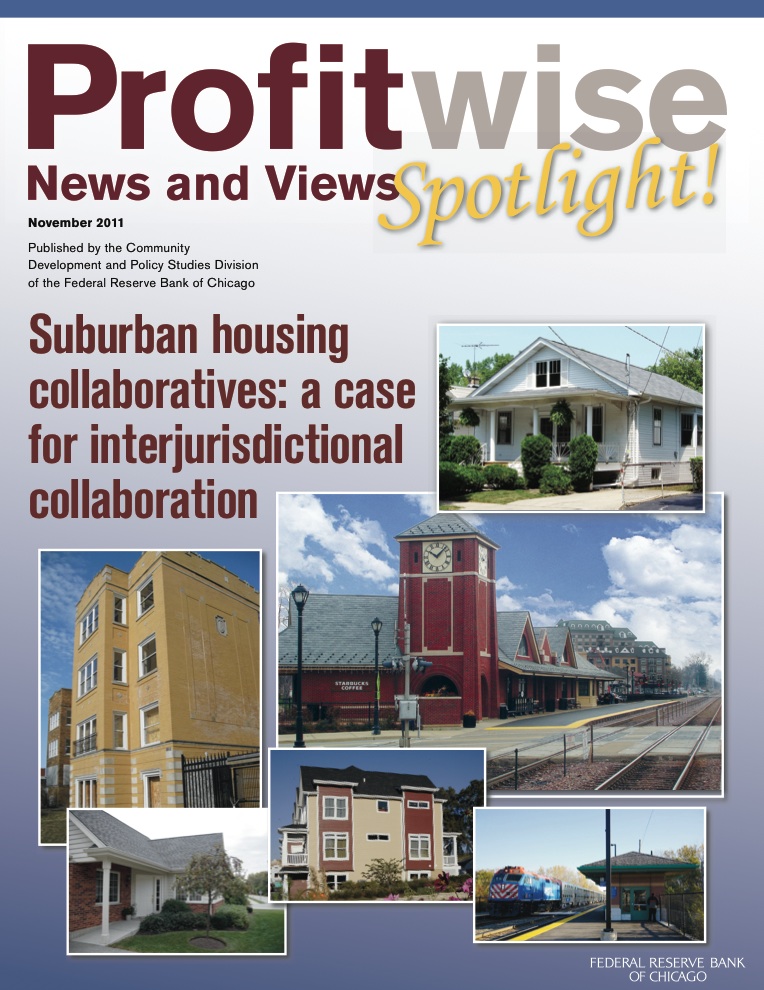Suburban Housing Collaboratives: a Case for Interjurisdictional Collaboration

The November 2011 edition of ProfitWise News and Views, written by Susan Longworth and published by the Community Development and Policy Studies Division of the Federal Reserve Bank of Chicago, features Suburban Housing Collaboratives: a Case for Interjurisdictional Collaboration. The report profiles four clusters of neighboring communities in metropolitan Chicago that are addressing similar and unique housing and economic development challenges by working together across municipal borders, and with the private and philanthropic sectors, to prioritize and leverage resources and have the greatest local and regional impact.
Known as interjurisdictional collaboration, this new model is being nurtured and supported by myriad partners across the region, including the Metropolitan Planning Council (MPC), Metropolitan Mayors Caucus, and Chicago Metropolitan Agency for Planning. These three groups co-authored a foreword to the Fed’s paper (download above, or read below), which provides important context for the report. They describe the massive effort communities and regional partners have committed to achieve what they have to-date; and the need for policy, regulatory and finance reforms to make interjurisdictional collaboration easier, more effective, and more replicable. Please read the foreword before diving into the paper, which lays the groundwork for MPC and partners to advance these reforms in the coming months and years.
Foreword
Dear Profitwise News and Views readers:
At a time when resources are in short supply at all levels of government, it is far too easy to become distracted from the ultimate goal – economic recovery – by fighting over crumbs. Instead, with different priorities and strategies, four clusters of communities in metropolitan Chicago are flipping the script on this challenging economic reality. As profiled in this issue of Profitwise News and Views by author Susan Longworth, new public-private partnerships are being forged across municipal and political borders to prioritize and leverage housing and economic development resources where they will have the greatest local and regional impact.
Known as interjurisdictional collaboration, this model, while still nascent, is being nurtured in the living laboratory that is Chicagoland. These clusters have achieved early successes by committing to joint strategies, and applying for and securing funding for redevelopment opportunities through public, private and philanthropic commitments. All told, the four clusters have attracted more than $22 million in federal funding over two years, as well as kudos from the Obama administration, the Brookings Institution, and other industry leaders.
While impressive, each time these clusters secured public resources through a joint application it was a painful, bureaucratic process. Government funding often discourages an application from a group of communities, forcing municipalities to compete rather than cooperate. Another missed opportunity: Funding that is available generally covers capital costs, but not administrative. As Longworth’s case studies underscore, building local capacity by hiring a single coordinator or identifying a common development partner has been critical to the success of Chicagoland’s clusters, demonstrating how powerful it is when one is assigned to navigate while everyone else rows.
Longworth concludes by posing many important questions about interjurisdictional collaboration – questions our organizations have been grappling with as we’ve worked to support multi-town collaboration on the ground in this region. We are beginning to tease out answers to these questions, which will inform more specific policy recommendations in the coming months. To make interjurisdictional collaboration easier, more effective, and more replicable, the recommendations will identify ways to remove bureaucratic barriers, secure long-term resources to make capital and administrative investments, and determine other incentives for collaboration.
We are confident that by working together communities can take a faster track to stability and sustainable economic growth; and we remain committed to supporting local leaders with the politically and technically difficult challenges involved. The following report lays the groundwork for policy change that will promote greater interjurisdictional collaboration, stronger local economies, and more resilient metropolitan regions.
Sincerely,
MarySue Barrett, President, Metropolitan Planning Council
David E. Bennett, Executive Director, Metropolitan Mayors Caucus
Randy Blankenhorn, Executive Director, Chicago Metropolitan Agency for Planning